|
|
|
Sort Order |
|
|
|
Items / Page
|
|
|
|
|
|
|
| Srl | Item |
| 1 |
ID:
076930


|
|
|
|
|
| Publication |
2007.
|
| Summary/Abstract |
This article addresses the increasing militarisation of the Italian borders and the establishment of detention centres reminiscent of concentration camps as a state response to potential immigrants, asylum seekers and others. We suggest that this militarisation should be understood as part of the remaking of the Italian state in relation to recent Italian political and economic history and the current hegemonic social and political ethos in Europe more generally. Since early 1990s, European, and specifically Italian ideology has embraced a neoliberal ethos of individualism and cultural particularity that encourages the politicisation of exclusionary regional and national geographies and the intensified policing of the borders. In the current political and economic context, non-Europeans from poor countries seeking entry into Italy are categorised as outsiders and therefore non-human. The ethos made popular by Italian political parties since the l990s degrades moral claims, extracts citizens from their embeddedness in social relations, and wipes out any possible space for the purely human being.
|
|
|
|
|
|
|
|
|
|
|
|
|
|
|
|
| 2 |
ID:
068411


|
|
|
| 3 |
ID:
172771


|
|
|
|
|
| Summary/Abstract |
In many European countries established leftwing and rightwing parties have been threatened by policy convergence and, in turn, new populist parties that offer more polarized platforms. I investigate whether government ideology influences dragnet-controls – controls of persons conducted by the police without having any suspicion that the controlled person committed a crime. They took effect after the Schengen Agreement in 1995. I propose dragnet-controls to be a prime example of ideology-induced policies implemented by established parties. Dragnet-controls confine citizens’ liberties, but may help to detect criminals. Using data from the 16 German states over the period 1995–2017, I show that rightwing governments have been active in implementing dragnet-controls and leftwing governments have denied dragnet-controls since the mid 1990s. When evaluating how government/party ideology influences individual policies, previous econometric studies ignored initiatives in parliament. My study also considers initiatives in parliament. I conjecture that, since 2015, the rightwing CDU has used initiatives to introduce/extend dragnet-controls to also deal with the upcoming threat of rightwing populism. Future research should examine policy-differences between the established parties regarding more fine-grained policy measures also in other European countries.
|
|
|
|
|
|
|
|
|
|
|
|
|
|
|
|
| 4 |
ID:
132505
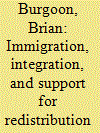

|
|
|
|
|
| Publication |
2014.
|
| Summary/Abstract |
Immigration poses individual or collective economic risks that might increase citizen support for government redistribution, but it can also generate fiscal pressure or undermine social solidarity to diminish such support. These offsetting conditions obscure the net effects of immigration for welfare states. This article explores whether immigration's effects are mediated by the economic and social integration of immigrants. Integration can be conceptualized and measured as involving the degree to which immigrants suffer unemployment rates, depend on welfare-state benefits, and harbor social attitudes similarly to the native population. Such integration may alter how immigration reduces solidarity and imposes fiscal and macroeconomic pressures, but does not much alter how immigration spurs economic risks for natives. Where migrants are more integrated by such measures, immigration should have less negative or more positive implications for native support for government redistribution and welfare states than where migrants are less integrated. The article explores these arguments using survey data for twenty-two European countries between 2002 and 2010. The principal finding is that economic integration, more than sociocultural integration, softens the tendency of immigration to undermine support for redistributive policies.
|
|
|
|
|
|
|
|
|
|
|
|
|
|
|
|
| 5 |
ID:
112923


|
|
|
|
|
| Publication |
2012.
|
| Summary/Abstract |
This paper applies panel data techniques to analyze the role of the various energy sources in economic growth, for a set of 24 European countries (1990-2007), controlling for energy consumption and energy dependency. The results suggest that the negative effect of the use of renewables supplants the positive effect of creating income by exploiting a natural resource locally, and thus growth does not appear to improve with the change towards renewables. The high costs of promoting renewables are probably being placed excessively upon the economy, namely by increasing the costs of electricity tariffs, thus inducing a deceleration in economic activity. Fossil fuels lead to dissimilar effects on growth while natural gas does not appear to be relevant in explaining growth. Coal hampers the capacity for growth, whereas the use of oil stimulates that growth. This is in line with productive structures that are deeply grounded in fossil fuels, particularly oil.
|
|
|
|
|
|
|
|
|
|
|
|
|
|
|
|
| 6 |
ID:
168331


|
|
|
|
|
| Summary/Abstract |
This paper proposes an approach to comparing and assessing the policy settings in the European low-carbon energy scenarios. First, it presents the methodology including ten characteristics for scenario assessment: modelling framework (diversity), ambitiousness of the targets 2050, relations with other (European) countries, stakeholder involvement, technology options, non-technological aspects, economic component, usage of scenarios in policy design, intermediate indicators of targets' achievement and revision of scenarios. Further, it uses qualitative and quantitative methods to evaluate energy scenarios developed in six north-west European countries (the Netherlands, Germany, France, Denmark, the UK, Belgium). Finally, conclusions are made concerning the possible ways of scenario design improvement. The analysis has shown that all selected countries have potential for modifying their energy scenarios, which being implemented may help to achieve the joint European targets 2050. Since these countries are socially and economically interrelated, a more harmonised approach to scenario development is needed to be designed and introduced on the EU level. Ten characteristics proposed in this study may serve as an initial input for such harmonisation. The results can be of interest to economists, business and academic representatives, and especially policy makers involved in the long-term energy scenario development on the international, regional and national level.
|
|
|
|
|
|
|
|
|
|
|
|
|
|
|
|
| 7 |
ID:
119903
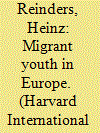

|
|
|
|
|
| Publication |
2012.
|
| Summary/Abstract |
Cars were burning from rioting on the streets. Moroccan and Algerian youth were running amok in the suburbs of Paris and Lyon. Helpless police forces were unable to control the escalating violence. Then-Minister of Internal Affairs Nicolas Sarkozy threatened the mob with announcements of tighter law enforcement and stricter legal penalties. Eventually, the situation was brought under control, but those events left a lasting impression. In 2005, Europeans realized they were confronted with a young migrant generation that was at-risk and in need of serious attention.
|
|
|
|
|
|
|
|
|
|
|
|
|
|
|
|
| 8 |
ID:
116118
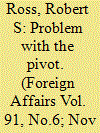

|
|
|
|
|
| Publication |
2012.
|
| Summary/Abstract |
Ever since the Chinese leader Deng Xiaoping opened up his country's economy in the late 1970s, China has managed to grow in power, wealth, and military might while still maintaining cooperative and friendly relations with most of the world. Until a few years ago, that is, when Beijing seemed to change tack, behaving in a way that alienated its neighbors and aroused suspicion abroad. In December 2009, for example, Beijing's resistance to compromise at the UN Climate Change Conference angered European countries and the United States.
|
|
|
|
|
|
|
|
|
|
|
|
|
|
|
|
| 9 |
ID:
137934
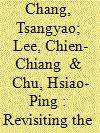

|
|
|
|
|
| Summary/Abstract |
This study revisits the long run and dynamic causal linkages between defense spending and economic growth in 15 selected European countries for the period 1988–2010 by utilizing recent developments in non-stationary panel data analysis. To this end, the series properties of per capita defense spending, per capita real capital stocks, and per capita real GDP are investigated by the panel unit root tests with and without breaks that support evidence on unit root. The panel cointegration tests with and without breaks are also subsequently employed to investigate whether there exists a long-run equilibrium relationship between these three variables. Finally, our causality analysis from panel vector error-correction model suggests that there is a feedback relation between real capital stock and real GDP in both short and long run, a one-way Granger causality running from real GDP to defense spending in both short and long run, and defense spending only Granger causes real capital stock in the long run.
|
|
|
|
|
|
|
|
|
|
|
|
|
|
|
|
| 10 |
ID:
086768


|
|
|
|
|
| Publication |
2009.
|
| Summary/Abstract |
Since Tocqueville's seminal writings, voluntary associations have been proclaimed to be schools of democracy. According to this claim, which regained popularity during the 1990s, involvement in voluntary associations stimulates political action. By participating in these associations, members are socialised to become politically active. Supposedly, having face-to-face contact with other members induces civic mindedness - the propensity to think and care more about the wider world. Participating in shared activities, organising meetings and events, and cooperating with other members are claimed to induce civic skills and political efficacy. Over the years, many authors have elaborated on these ideas. This article offers a systematic examination of the neo-Tocquevillian approach, putting the theoretical ideas to an empirical test. It offers a critical overview of the literature on the beneficial role of voluntary associations and dissects it into five testable claims. Subsequently, these claims are tested by cross-sectional, hierarchical analyses of 17 European countries. The authors conclude that the neo-Tocquevillian theory faces serious lack of empirical support. In line with the expectations, they find a strong, positive correlation between associational involvement and political action. Moreover, this correlation is positive in all countries under study. However, more informative hypotheses on this correlation are falsified. First, the correlation is stronger for interest and activist organisations than for leisure organisations. Second, passive (or 'checkbook') members show much higher levels of political action than non-involved, whereas the additional effects of active participation are marginal. Third, the correlation between associational involvement and political action is not explained by civic skills and civic mindedness. In sum, the authors find no evidence for a direct, causal relation between associational involvement and political action. The socialisation mechanism plays a marginal role at best. Rather, this article's findings imply that selection effects account for a large part of the correlation between associational involvement and political action. The conclusion reached therefore is that voluntary associations are not the schools of democracy they are proclaimed to be, but rather pools of democracy.
|
|
|
|
|
|
|
|
|
|
|
|
|
|
|
|
| 11 |
ID:
139593
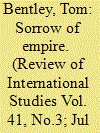

|
|
|
|
|
| Summary/Abstract |
Unexpectedly, several prominent European countries have begun to issue official state apologies to their former colonies. What does this proliferation of official colonial sorrow from such countries as Germany, Belgium, Italy, and Britain reveal about the normative tenets of the contemporary international order? This article analyses colonial apologies as crucial symbolic and ritualistic sites where state elites project liberal credentials and affirm liberal normative tenets in the international system. Specifically, the article demonstrates how these apologies for colonial atrocity appear to reinforce liberal conceptions of human rights, the renunciation of violence, cordial relations with formerly colonised states, and commitments to state accountability and transparency. Yet, textual analysis of several state apologies reveals that these performatives simultaneously contradict each of these liberal tenets. It finds that – even in apology – political elites reflect ambivalence about certain human rights violations; persist in glorifying or sanitising the violent colonial past; recycle paternalistic and hierarchical discourses and policies towards the apology's recipients; and offer contradictory notions of the state's historical responsibility. In exposing these performative contradictions of empirical sorrow, the article seeks to expand the discipline's understandings of, and dilemmas within, a key performative and ritualistic legitimation strategy whereby liberalism reproduces itself in the international system.
|
|
|
|
|
|
|
|
|
|
|
|
|
|
|
|
| 12 |
ID:
083682


|
|
|
|
|
| Publication |
2008.
|
| Summary/Abstract |
The British government's appeasement of fascism in the 1930s derived not only from economic, political, and strategic constraints, but also from the personal ideologies of the policy makers. Widespread guilt about the terms of the Versailles Treaty and tensions with France created sympathy for German revisionism, but the Cabinet properly recognized that Nazi Germany represented the gravest threat to peace in the 1930s. Fear of war and the recognition that Britain would have to tolerate peaceful change underlay attempts to appease the dictators, culminating in the Munich agreement in September 1938. After Munich, continued German belligerence, the Kristallnacht, and British intelligence assessments indicating that Hitler was prepared to attack the Western powers led to a reassessment of appeasement. The British government gave security guarantees to several European countries, seeking to deter future aggression and to lay the groundwork for a successful war against Germany should it prove necessary. While most of the British elite detested communism, anti-communist views did not govern British policy; security considerations required Soviet support in Eastern Europe, and Britain and France made a determined effort to secure Soviet support for the Peace Front
|
|
|
|
|
|
|
|
|
|
|
|
|
|
|
|
| 13 |
ID:
119902
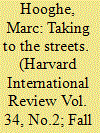

|
|
|
|
|
| Publication |
2012.
|
| Summary/Abstract |
Since 2011, various European countries have experienced periods of intensive political turmoil, with mass demonstrations that have sometimes turned violent. The high level of mobilization contradicts the often-expressed idea that young generations are no longer interested in politics, but hit the hardest by the economic downturn, the youth are most motivated to mobilize themselves.
|
|
|
|
|
|
|
|
|
|
|
|
|
|
|
|
| 14 |
ID:
144490


|
|
|
|
|
| Summary/Abstract |
The southern Mediterranean rim forms part of what the former Swedish foreign minister Carl Bildt called in a recent speech in Washington, DC, the “ring of fire” around Europe. Coupled with continued sluggish growth across Europe, the ongoing Greek crisis, and the rise of populist parties in many European countries, the European neighborhood faces a long litany of challenges, and the outcomes will define and determine the future of Europe and regions beyond. The broader Mediterranean region plays an integral role in this drama. While the economic and political problems of Europe have been simmering for more than five years, the security challenges have arguably emerged more suddenly and quickly.
|
|
|
|
|
|
|
|
|
|
|
|
|
|
|
|
|
|
|
|
|